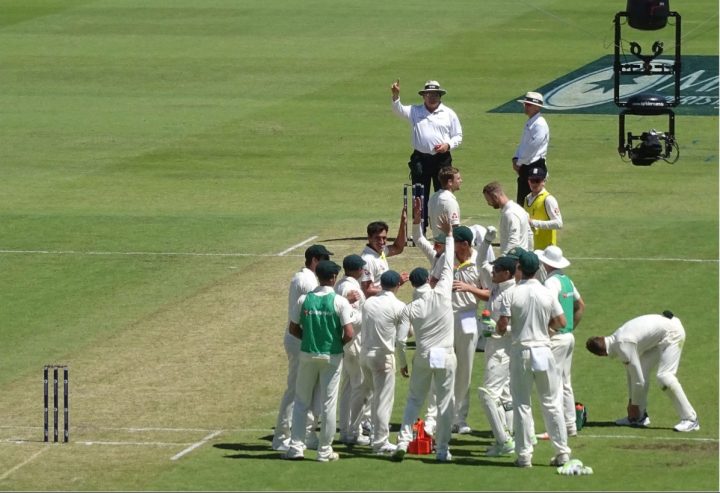I’m not a socialist. Nor am I a moralist. But, like most people, I can tell the basic difference between right and wrong. Unfortunately, it looks like the ECB, CA and the BCCI no longer can.
I’m not going to pretend I know everything that goes on in the inner sanctums of the ICC. All I can do is form an opinion based on the little I know. Maybe my views are misplaced; maybe they’re not. But from what I’ve read and seen this week, the behaviour of the so-called ‘big three’ is nothing short of deplorable. Disgraceful.
This is what us ordinary cricket fans know: the ECB, CA and the BCCI are effectively hijacking the ICC. They’ve designed a new plan for test cricket, which proposes two divisions, and they’ve manoeuvred skilfully to solidify their financial and political muscle at the expense of everything, and everyone, else.
What’s more, today the BCCI has threatened to boycott ICC events if they don’t get their self-interested way. That’s right, they’re behaving like a selfish child hoarding all the sweets.
The big three, or should that be the bad three, are calling their plan for two divisions a meritocracy – much like superpowers dominate weaker countries, allow big business to run rampant within their borders, and call it democracy.
Of course, if we look behind the plan we discover (surprise, surprise) that it’s anything but fair. Here’s the catch: India, England and Australia will be exempt from relegation. Meritocracy? Don’t make me laugh.
The bottom line is they’re creating a top table in world cricket and unashamedly ring-fencing their place at the head of it (whether their respective teams are good enough to belong there or not).
To describe this plan as dastardly doesn’t quite cut the mustard. It would, quite frankly, make Sepp Blatter proud. What next? The cricket world cup in Russia?
How must the likes of New Zealand, the West Indies, Pakistan, Sri Lanka and South Africa feel? These countries have been trying to catch up (in terms of financial clout); now they’ll fall further behind.
To consign some of these proud cricketing nations to a second division while the English, the Aussies and the Indians look downwards smugly, just isn’t fair.
I won’t go on about the specific drawbacks of two divisions too much. To highlight its potential problems – imagine the uproar, for example, if India finished bottom of division one and denied an unbeaten Pakistan promotion – would be an exercise in pointing out the flamin’ obvious. What we should discuss, however, is the ECB’s part in all this.
David Hopps wrote an interesting article on Cricinfo the other day admiring Giles Clarke’s skill and force of personality. There’s little doubt that many cricket officials around the shires will be delighted at the ECB’s stance. “Sod the rest”, they’ll be saying behind closed doors, “this is business … survival … natural selection”.
George W. Bush would agree with them. So would other politicians and economists just left of Genghis Khan: “Giles Clarke has been dealing with the harsh realities of cricketing power politics and emerged victorious”.
There’s no doubt Giles Clarke has shown incredible skill to end the ECB’s apparent isolation at the ICC. To forge a new partnership with the intransigent BCCI (who have been hostile to English cricket for a number of reasons) is a good effort. But is it as simple as that?
Of course, one could argue (a bit like the Liberal Democrats did when forming the coalition) that it’s better to be on the inside than on the outside looking in. We heard Nick Clegg argue a few times that you can manipulate policy from inside the government, but to do so from the opposition benches is impossible.
Perhaps it’s a good thing, therefore, that the ECB is at the top table – even if it means conspiring with the BCCI. We know, for example, that the ECB champions the cause of test cricket. At least test cricket will have a supporter at the heart of the ICC.
But can we trust the ECB to do this effectively? Thus far they’ve largely failed to help test cricket at all. England play far too much of it; therefore test matches have become somewhat devalued. Nothing devalues the Ashes more, for example, than playing back-to-back series, with another series starting in just eighteen months time.
The ECB see the Ashes as a golden goose – much like they saw domestic T20 as a golden goose – and we all know what happens when the ECB sees a beautiful gilded birdie with a posterior perfect for producing eggs: they ruin everything through over-exposure.
What’s more, you’ll be interested to know that the big three’s proposal contains no plans for a world test championship. Instead, it proposes the return of the much-maligned Champions Trophy. Another meaningless ODI trophy eh? Woo Hoo!
Some of you will see this as a political issue. Yours views on the plan might even correspond with your political persuasions.
If you’re a hardnosed ‘realist’ (i.e. if anyone disagrees with you they’re not being realistic) you might think this is a brilliant plan that secures the financial future of cricket in England. If you’re more of a utopian, and still believe the world can operate fairly – in other words, you’re a leftie or a closet lefty – you’ll be appalled.
Personally, I see myself as someone in the middle when it comes to politics. I try to see both sides, and try my best to be objective (if such a thing is possible). However, as someone who hates the way some sports have been ruined by money – I’m looking at you Premier League football – these developments at the ICC are alarming and unwelcome.
One of the problems with the Premier League is that only the very, very rich clubs can win it. This has ruined it for me, because the club I support no longer has a chance. The league isn’t as competitive as it should be because it doesn’t operate on a level playing field. Most clubs are there simply to make up the numbers and desperately cling on to the gravy train they’d go bankrupt without. They’re not trying to compete (they know their place in the scheme of things); they’re merely trying to survive.
I know that parallels aren’t exact, but surely a similar fate awaits the supporters and administrators in New Zealand, the West Indies, Pakistan etc. How will they attract good crowds? How will their players learn to compete with the best? How will their boards ever challenge the supremacy of India, England and Australia if they’re languishing in a second division?
The ICC should be run to serve the needs and aspirations of the majority. It should regulate the game, tinker with laws when needed, encourage the growth of cricket worldwide, and distribute wealth in an equitable way. It’s simply not right for it to run roughshod over the needs of the majority in order to protect the vested interests of its most powerful members.
The actions of the ECB, CA and the BCCI are destroying any remaining hope that cricket can operate like a sporting community rather than a cynical game of international power politics. Let’s not pretend this proposal is about helping affiliate nations compete with the lower ranked test playing nations. It’s about the rich getting richer.
This is a desperate shame. Call me a naive romantic, but the phrase “it’s just not cricket” was invented for circumstances just like these.
James Morgan










James, what on Earth is going on? Two articles in a row and I completely agree you on both???????
Personally I don’t see anything wrong with a two division system as long as it fair and equitable for all.
In Australia part of the system to ensure close competition in the various football leagues is for the weaker sides to be subsidised by the wealthy in order to foster talent and encourage a more level playing field. They have recognised that it is in the interests of all teams to have a close competition where all fans believe their team can win.
I have to say that I’m not surprised the BCCI is at the heart of this and I’m less surprised that CA and the ECB have gone along for the ride. The Indian system is, at worst, corrupt and, at best only interested in money for India. The ECB and CA are addicted to the crumbs that fall to them from Indian table.
Can somebody please tell me why they need all this money?
Didn’t world cricket manage very nicely when there were few if any sponsors, games could be watched on television without having to pay a subscription and the players got to see their families from time to time.
Didn’t we all look forward to a test series so much partly because they didn’t come up all that often?
Surely the ultimate test of whether this is a good idea has to be Cicero’s question – Cui bono?
I think the answer is definitively not the fans.
Can I be the first to congratulate England on a great win in Perth. Cook captained brilliantly for the first in I don’t know how long and the players executed their play with precision and flair.
Well done, still not a great tour but something to celebrate at last.
Was this Cook’s road to Damascus moment?
Very pleasing win today. But having written off the ODIs as irrelevant when we were losing, we can’t really bang on about them too much now we’ve finally won one ;-)
“We heard Nick Clegg argue a few times that you can manipulate policy from inside the government, but to do so from the opposition benches is impossible.”
Do you know when he is going to start?
Clarke should resign.
I suppose its inevitable that greed and corruption win the day in any organisation. I’m the same as you James, I have a romantic view of cricket and believe in the roots of inclusiveness and equality as its very soul. Half the charm of cricket for me growing up, was that the only real difference between village cricket and an International test match was the skill of the players involved. These days, the fat cats, the networks and the sponsors have contrived to muddy the waters.
By the way, thankyou England for making my insomnia worth having for once ! Great play by Stokes and Butler.
“The ICC should be run to serve the needs and aspirations of the majority. It should regulate the game, tinker with laws when needed, encourage the growth of cricket worldwide, and distribute wealth in an equitable way. It’s simply not right for it to run roughshod over the needs of the majority in order to protect the vested interests of its most powerful members.”
You are talking about something that doesn’t go on in the real world, so is hardly likely to work in sport when it is seen as a business
You are talking about how democracy should work and doesnt due to… guess what, the money involved..
There are lots of things in the real world that operate fairly, even when lots of money is involved. Look at the NFL for example: a salary cap all can afford, revenue sharing, plus decisions made for the overall health of the sport and the league, not just the richest. I just wish cricket had the same moral compass. It is possible.
Well done to Mike Atherton for saying, more or less, exactly the same things as us in today’s The Times. Here’s a cricinfo summary http://es.pn/1cl8v00.
According to Athers, the proposal represents “the end of the notion that a fair and principled and just body can govern cricket in the interests of all … it is an ideal, of course, that has never been grounded in any kind of reality under the guise of the ICC, but if you cannot be idealistic about sport, what can you be idealistic about?”
[…] The ECB and BCCI are in cahoots to stitch up world cricket through the Big Three […]